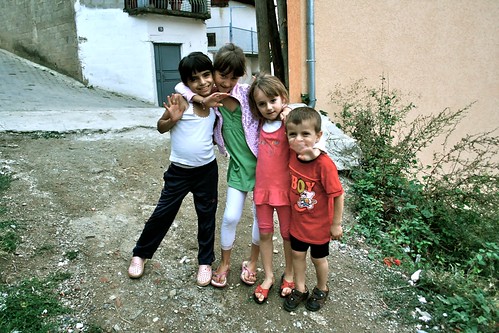Adopting from Serbia
Contents
Serbia Adoption Alert
Notice: Adoptions from Serbia to Begin Under the Hague Adoption Convention (March 19, 2014)
The Hague Convention on Protection of Children and Co-Operation in Respect of Intercountry Adoption (the Convention) will enter into force for Serbia on April 1, 2014. The United States has determined that it should be able to process Convention intercountry adoptions from Serbia that are initiated on or after April 1, 2014.
The Government of Serbia also notified the U.S. Embassy in Belgrade that accredited adoption service provider, Hopscotch Adoptions, Inc., is now authorized to provide services in Convention adoptions from Serbia. This is the only U.S. adoption service provider currently authorized to operate in Serbia. U.S. adoption service providers interested in seeking authorization should contact Serbia’s Ministry of Labor, Employment and Social Policy at: socijalna_zastita@minrzs.gov.rs or by calling +381 11 3631448.
U.S. prospective adoptive parents and adoption service providers are reminded that adoption services in Serbia can only be completed either through direct contact with the Ministry or with the assistance of a U.S. adoption service provider authorized to provide intercountry adoption services in Serbia.
Adoption cases can proceed under the non-Convention adoption process after April 1 if the prospective adoptive parents in the United States filed Form I-600A with the U.S. Citizenship and Immigration Service (USCIS) designating Serbia before April 1, 2014, filed Form I-600 with USCIS or the Department of State before April 1, 2014, or completed the adoption before April 1, 2014. All other cases will be processed as Convention adoption cases and will require Form I-800 and I-800A.
The Department of State will provide updated information on adoption.state.gov as it becomes available. If you have any questions about this notice, please contact the Office of Children’s Issues at 1-888-407-4747 within the United States, or 202-501-4444 from outside the United States. Email inquiries may be directed to AdoptionUSCA@state.gov.
Alert: Serbia Adoption Reports of Misleading Guidance on Intercountry Adoptions from Serbia (May 9, 2013)
This Adoption Alert is a follow up to the Alert of March 29, 2013.
The U.S. Embassy in Belgrade has received reports that one or more U.S. adoption service providers may be providing prospective adoptive parents misleading information about the Serbian adoption process. Specifically, there may be misleading information as to who is authorized to provide adoption services and which children are eligible for intercountry adoption.
Serbia places a priority on domestic adoption. Generally, only children with special needs are available for intercountry adoption. Adoption services in Serbia can be completed either through direct contact with the Ministry or with the assistance of an authorized U.S. adoption service provider. A small number of U.S. adoption service providers are authorized by the Serbian Ministry of Labor, Employment, and Social Policy to provide services related to intercountry adoptions in Serbia. Prospective adoptive parents who decide to use an adoption service provider may wish to verify the agency’s authorization by contacting the Ministry at socijalna_zastita@minrzs.gov.rs or by calling +381 11 3631448.
The Department strongly encourages prospective adoptive parents to read the procedures for completing an intercountry adoption from Serbia on the Department’s Serbia adoption information page. There is no legal alternative to the Serbian adoption process. Prospective adoptive parents who received contradictory or misleading information from a U.S. accredited or approved adoption service provider are encouraged to register a complaint about the provider online through the Hague Complaint Registry, at: adoption.state.gov/hague_convention/agency_accreditation/complaints.php.
Prospective adoptive parents are also encouraged to report such activity by an adoption service provider that is not accredited or approved to the licensing authority of the state where the agency is located. A record of the complaint may also be submitted to the Office of Children’s Issues via email to AskCI@state.gov.
Hague Convention Information
Serbia is not party to the Hague Convention on Protection of Children and Co-operation in Respect of Intercountry Adoption(Hague Adoption Convention). Intercountry adoptions of children from non-Hague countries are processed in accordance with 8 Code of Federal Regulations, Section 204.3 as it relates to orphans as defined under the Immigration and Nationality Act, Section 101(b)(1)(F).
NOTE: Adoption services in Serbia can be completed either through direct contact with the Serbian Ministry of Labor, Employment, and Social Policy (“Ministry”) or with the assistance of an authorized U.S. adoption service provider. Contact information for the Ministry is provided in the “Contact Information” section below. A small number of U.S. adoption service providers are authorized by the Ministry to provide services related to intercountry adoptions in Serbia. Prospective adoptive parents who decide to use an adoption service provider should verify the agency’s authorization by contacting the Ministry.
Who Can Adopt
In addition to U.S. immigration requirements, you must also meet the following requirements in order to adopt a child from Serbia:
Residency
None.
Age of Adopting Parents
Prospective adoptive parents must be at least 18 years older than the child, but no more than 45 years older.
Marriage
If there are two prospective adoptive parents, they must be married. A common-law marriage can qualify. Single prospective adoptive parents are also eligible to adopt a child in Serbia with special approval from the Ministry. Same-sex couples are not permitted to adopt.
Income
Serbian Family Law does not specify income requirements. The adoption authority relies on the U.S. home study when determining the eligibility of prospective adoptive parents.
Other
Prospective adoptive parents who have been diagnosed with a mental disorder or infectious disease are disqualified from adopting. Prospective adoptive parents with other serious health conditions must demonstrate to the Ministry their ability to raise the child.
Who Can Be Adopted
In addition to U.S. immigration requirements, Serbia has specific requirements that a child must meet in order to be eligible for adoption:
Age of Adoptive Child: Children between the ages of two months and 18 years are eligible for adoption. However, a foreign citizen may adopt a child in Serbia only after the child has been registered for adoption for at least one year and no domestic adopters have been found.
Sibling Adoptions: Serbian Family Law does not specifically address sibling adoptions. However, adoption authorities try to place siblings together if they determine that it is in the best interest of the siblings.
Special Needs or Medical Conditions: These topics are not specified in Serbian family Law, but in practice, because Serbia gives preference to domestic adoption (i.e., adoption by Serbian citizens), only children with special needs become available for inter-country adoption.
Waiting Period or Foster Care: A foreign citizen may adopt a child in Serbia only after the child has been registered for adoption for at least one year and no domestic adopters (i.e., Serbian citizens) have been found.
Caution: Prospective adoptive parents should be aware that not all children in orphanages or children’s homes are adoptable. In many countries, birth parents place their child(ren) temporarily in an orphanage or children’s home due to financial or other hardship, with the intention of returning for the child when they are able to do so. In such cases, the birth parent(s) rarely would have relinquished their parental rights or consented to their child(ren)’s adoption.
How to Adopt
Adoption Authority
The Process
Traveling Abroad
Applying for Your U.S. Passport
A valid U.S. passport is required to enter and leave Serbia. Only the U.S. Department of State has the authority to grant, issue, or verify U.S. passports. Getting or renewing a passport is easy. The Passport Application Wizard will help you determine which passport form you need, help you to complete the form online, estimate your payment, and generate the form for you to print-all in one place.
Obtaining Your Visa
In addition to a U.S. passport, you also need to obtain a visa. A visa is an official document issued by a foreign country that formally allows you to visit. Where required, visas are attached to your passport and allow you to enter a foreign nation. To find information about obtaining a visa for Serbia, see the Department of State's Country Specific Information.
Staying Safe on Your Trip
Before you travel, it's always a good practice to investigate the local conditions, laws, political landscape, and culture of the country. The State Department is a good place to start. The Department of State provides Country Specific Information for every country of the world about various issues, including the health conditions, crime, unusual currency or entry requirements, and any areas of instability.
Staying in Touch on Your Trip
When traveling during the adoption process, we encourage you to register your trip with the Department of State. Travel registration makes it possible to contact you if necessary. Whether there's a family emergency in the United States, or a crisis in Serbia, registration assists the U.S. Embassy or Consulate in reaching you. Registration is free and can be done online.
After Adoption
What resources are available to assist families after the adoption?
Many adoptive parents find it important to find support after the adoption. Take advantage of all the resources available to your family -- whether it's another adoptive family, a support group, an advocacy organization, or your religious or community services.
Here are some good places to start your support group search:
Child Welfare Information Gateway
North American Council on Adoptable Children
Adoption Services Support Group for Adopting Persons
SOURCE
Intercountry Adoption, Bureau of Consular Affairs. U.S. Department of State Country Information








